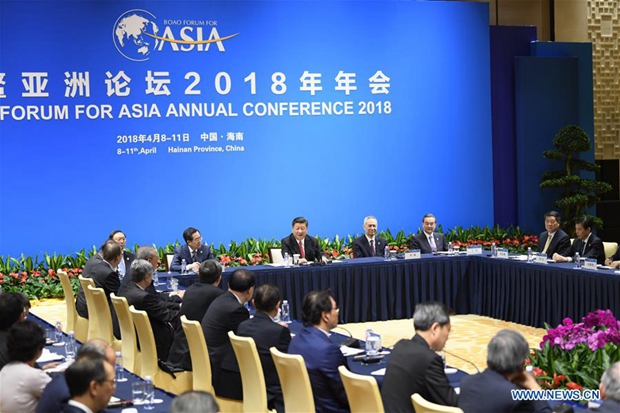The dangers of reading tea leaves in China
- By Einar Tangen
 0 Comment(s)
0 Comment(s) Print
Print E-mail China.org.cn, April 13, 2018
E-mail China.org.cn, April 13, 2018
Despite China's ubiquitous daily presence in reporting from major media outlets, very little about its political, economic or social goals and systems are known or understood outside its borders. Unfortunately, this has resulted in an asymmetrical understanding of China, so even as China's political and economic importance grows, understanding of the country diminishes.

To understand the speech that Chinese President Xi Jinping gave in Hainan on Tuesday at the 2018 Boao Forum for Asia, the annual Chinese-sponsored meeting of top Asian leaders, one has to look at the current context. The recent unilateral trade actions aimed at China by the U.S. do not stand alone. They are part of a package of policies and actions, which have labeled China as a long-term political, economic and military "strategic competitor;" put China and Russia in the same U.S. nuclear policy threat grouping; and challenged the basis of U.S.-China relations, the "one China" principle, through the passage of the recent Taiwan Travel and the National Defense Authorization Acts.
In this context, the unilateral trade tariffs are just the economic thrust of an anti-China policy, one that appeals not only to Trump, but to a large majority of Americans from across the political spectrum.
So, as most people look at Xi's speech at Boao through the lens of the immediate trade tensions created by President Trump's tariffs, unfortunately, they are looking for what they want to see, as opposed to the reality.
In China, policies are like glaciers, not Tweets. The Chinese government uses a bureaucratic consensus system that forces ideas to be studied, modeled, discussed, incubated and coordinated with existing policies before being considered for serious implementation. From idea to policy sometimes takes years, not seconds. While the government can react quickly, it uses options that have been thoroughly prepared in advance; like a boxer, what you see in the ring is the product of countless hours of practiced combinations and strategies.
In the case of Xi's speech to the Boao Forum, it is highly likely that 99 percent of it was written before Trump announced his second round of unilateral trade tariffs, aimed directly at China, on April 3.
Nothing in the speech, in terms of policy or timelines, is in any way different from the "opening-up statements" voiced at last October's National Congress of the Communist Party of China, and March's National People's Congress that followed. Even the somewhat vague implementation timelines remain the same.
China's message is that it is open for trade discussions with other nations and trade groups who embrace multilateralism and "win-win" solutions. But the red line is still very clear: Donald Trump needs to withdraw his unilateral trade tariffs if he wants to talk or China will follow its own course without the U.S. This is why they kept the vast majority of the speech intact, a signal that China will move on its goals, on its own schedule, not Donald Trump's or any other country's.
People should be paying attention to notable passages in Xi's speech. That "reform and innovation are the fundamental driving force of human progress. Those who reject them will be left behind and assigned to the dustbin of history" is an oblique reference to Trump's desire to return to the past and the futility of such Luddite thinking.
"We must refrain from seeking dominance and reject the zero-sum game," Xi also said. "We must refrain from beggaring-thy-neighbor and reject power politics or hegemony with the strong bullying the weak. Instead, we must properly manage differences and work together for enduring peace."
The Chinese president was expressing the point that with or without the U.S., the country will continue its policies on its own timetable: "I wish to make it clear to all that China's door of opening-up will not be closed and will only open even wider!"
Einar Tangen is a political and economic affairs commentator, author and columnist.
Opinion articles reflect the views of their authors, not necessarily those of China.org.cn.






Go to Forum >>0 Comment(s)